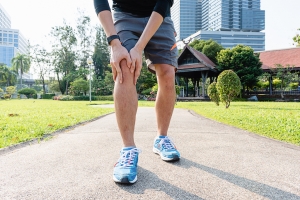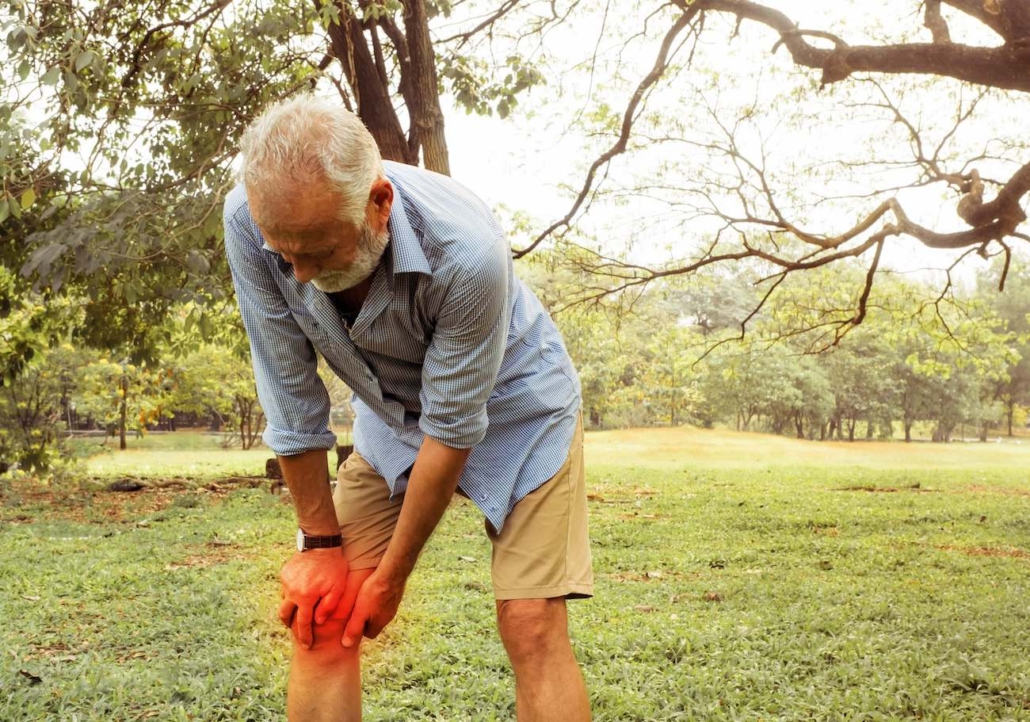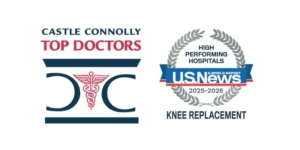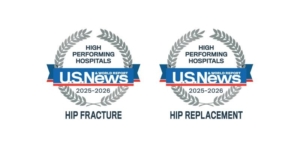What causes knee pain years after knee replacement?
Of all the questions I receive on my website from people around the world, queries about persistent residual pain and swelling that doesn’t subside one, two or three years after total knee replacement (TKR) are the most common.
The frequency of these questions is not surprising, as studies reveal that 15 to 20 percent of people who undergo total knee replacement are not happy with their result. Their knee may “look great” and their incision may have healed nicely, with no past history of a wound problem or infection. Any angular deformity (i.e., knock knees or bow legs) may have been corrected so the knee appears “nice and straight” and the knee may have achieved a full range of motion and not feel unstable, but sadly they still don’t feel comfortable.
These “look good but feel bad” knees represent a significant number of patients who have had a total knee replacement.
First, let me say that my patients do not experience this high incidence of dissatisfaction. I attribute their positive outcomes to my attention to balancing the soft tissues that support the knee using electronic pressure sensors (OrthoSensor) combined with computer navigation for optimal component positioning with meticulous soft tissue handling. I am exceptionally attuned to the subtleties and nuances of the surgery because of my many years of specializing in replacing knees and hips and, even more importantly, my experience figuring out what is wrong and revising a problematic knee replacement originally done by another surgeon.
In previous website articles I have addressed the many reasons there may be problems with a total knee replacement. Now I want to focus on when it’s time for patients to recognize there is a problem and start looking for solutions.
I cannot cite a specific time when someone’s knee is “as good as it gets” because everyone is unique and gets well at a different pace. I can, however, share what my extensive experience has taught me.
When my patients return two weeks after their total knee replacement for suture removal, they are typically pleased and grateful. Most have given up the walker and cane. Age plays a role in their recovery, with older folks more likely to use these walking aids to build their confidence and balance longer than younger patients. After suture removal, I encourage them to start walking and exercising in a pool if available. When most patients return four weeks later for x-rays, they are doing so well that I don’t need to see them again for several years. This is the typical scenario for my patients. Obviously, there are outliers, for various reasons.
Some of my patients report continued improvement in their range of motion and comfort even up to a year after their TKR, but most recover much faster. For some, swelling and a feeling of increased warmth over their knee improve over the first six to eight months. For others, some degree of residual soft tissue swelling or a change in the contour of the knee remains.
Causes for Concern
Residual swelling or fullness of the knee’s soft tissues is different than having a knee effusion. A knee effusion is when excess fluid develops in the knee joint. It is sometimes referred to as “water on the knee.” Having an effusion in the early post-operative period is 100% normal and expected. This fluid is residual blood from surgery and gets reabsorbed by our body over the first three or four weeks after surgery. It is not normal, however, for an effusion to remain or recur, which may suggest an underlying problem. A recurrent effusion, in which the effusion disappears and then returns or gets bigger and smaller after a total knee replacement, suggests a mechanical problem is recurrently aggravating the knee and creating a synovitis.
The synovium is the lining of our knee joint which normally secretes synovial fluid to help lubricate the joint. Prior to the TKR, this synovial fluid also helped nurture the cartilage. If there is a problem with the joint, which can be mechanical or due to infection, then the synovium becomes inflamed and secretes excess fluid. The excess fluid can distend the knee joint capsule and cause pain. It also can restrict range of motion. So a residual or recurrent effusion can be a clue that there is a problem with the total knee replacement.
Evaluating Pain
Some pain after a TKR is unfortunately normal. What I am observing however, is that my patients today get well much faster than even a couple of years ago because we are so much better at preventing and down regulating (decreasing) pain.
I’ve written extensively about our multimodal pain regime and other strategies aimed at educating patients and decreasing pain. These have made a world of difference. While some discomfort is expected, the level of pain and discomfort must be low enough to allow someone after their total knee replacement to mobilize, rehabilitate and sleep comfortably. The pain should be decreasing with each passing day. If pain is not decreasing or is at such a high level that one can’t rehabilitate or sleep comfortably, then this may also be a “red flag” that something is wrong.
I seldom see patients returning for their six-week post-operative visit complaining of a lot of pain. Most are completing their physical therapy and will take a “pain pill” prior to their therapy session. Most patients stop formal physical therapy after this appointment and continue on their own. And most are no longer taking pain pills on a round-the-clock schedule, which is what they did immediately after going home from the hospital. Instead, they are taking pain medication only as needed.
We also must keep in mind that while pain is very real, it is also very subjective. Some patients report remarkably little pain after their surgery and others experience pain to a much higher level. If a patient already takes narcotics prior to a knee replacement, then their threshold for pain is lower and treating it requires much higher doses.

Next Steps
All this being said, experiencing significant pain several months after a total knee replacement is not typical or expected and may indicate the need for a further work-up to look for its cause.
Total knees work extremely well when the components are optimally oriented to each other, the limb optimally aligned, the critically important soft tissue sleeve that supports the knee balanced and allowing the knee to move through a normal arch of motion with the knee’s complex movement pattern perfectly reproduced and no infection. When all of these factors come together like a symphony, patients are pleased. When they don’t, the knee can feel unstable, stiff, swollen or painful. I suggest that you return to your surgeon and share your complaints and concerns. If you’re not satisfied and your concerns are not relieved, then consider seeking an opinion from another orthopedic surgeon, preferably one with a special interest and skill in solving problems associated with total knee replacement.
When total knee replacements don’t hurt, function improves and patients can once again be pain-free, active and happy.
The Leone Center for Orthopedic Care at Holy Cross Health is located at 1000 NE 56th Street in Fort Lauderdale. For more information or to schedule a consultation, please call 954-489-4575 or visit holycrossleonecenter.com.






